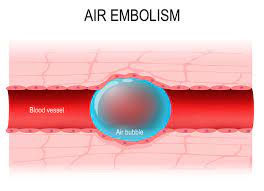Q: A few years ago, in preparation for my colonoscopy and gastroscopy, I had an IV l`ine inserted into my right arm, which was sedated.As I waited to pass out, I noticed a large bubble slowly moving down the IV line toward my arm.I was worried about an air embolism and called the nurse over, and she scoffed at my concern: “It’s just a bubble. It won’t hurt you.” I insisted on seeing the head nurse, and she came over, turned off the dropper, and gently tapped the Flick a few times to make the bubble move up.Then she pinched the line, turned the drip back on, and flicked a few more times until the air bubbles floated into the bag and shook to the top.She released her grip on the IV line, said, “There. Are you happy now?” and walked away.
Am I right to worry?I’m glad the sedatives hadn’t worked when the problem occurred.But I want to know the answer in case this happens again.
A: Before going to medical school, I also heard that injecting air into an IV can be fatal, so I understand why you are concerned.However, I have learned that the amount of air required to cause damage is very high.The bubbles may be 0.2 cc and still look very important in the IV tube.The smallest amount that can cause symptoms is 100 times that of 20 cc, but it can take longer to be fatal, usually over 150 cc.I bet nurses hear these concerns a lot.But that doesn’t excuse her behavior, it sounds rude as you describe it.

Q: Given that both AREDS (Age-Related Eye Disease Study) and AREDS-2 supplementation fail in nearly 70% of cases, do you advise patients whether Discontinue AREDS and AREDS-2 therapy?
A: Age-related macular degeneration is a common cause of vision loss in older adults.There are two forms: the proliferative or “wet” form is aggressively treated and is usually injected directly into the eye.There are no other treatments for the more common “dry” form other than the vitamin and mineral blend used in the study.You are correct that vitamins usually do not completely stop the progression of AMD, but may still slow it down.
In general, when treatment doesn’t work, it’s wise to stop it and try something else.However, since there are no other known treatments for dry AMD, a decision needs to be made as to whether the harms of the treatment outweigh any benefits.In this particular case, AREDS vitamins may slow progression compared to receiving no treatment at all.The risks of treatment are negligible.(The beta-carotene in the original AREDS formula increases the risk of lung cancer in smokers. Smokers with AMD should quit smoking and use the AREDS-2 formula.) The cost is fairly low, so I generally recommend continuing with supplementation.

Q: My brother takes turmeric every day after hearing all the hype about it being the new superfood.At his next annual check-up, it was noted that his platelets were very low.A month later, he died of a stroke.He is 70 years old.After doing some research on turmeric, I read that it does lower your platelets.Can low platelets lead to a stroke?This is just a precautionary story for your readers.
A: Turmeric is a commonly used culinary spice and is also widely used as a medicine around the world.It is generally considered safe.However, there is good evidence that curcumin (the active substance in turmeric) increases bleeding risk and acts like aspirin to reduce the “stickiness” of platelets.Instead of causing a drop in platelet levels, turmeric interferes with their function.
In most cases, this reduces the risk of stroke.Most strokes are caused by blood clots, and aspirin and similar drugs are often used to reduce the risk of strokes caused by blood clots.Unfortunately, with any medical intervention there is a risk of adverse effects.In your brother’s case, the stroke could have been caused by bleeding in the head.He may have a condition that lowers platelets – there are many, but the most common is an autoimmune disorder called idiopathic thrombocytopenic purpura – which may make the additional effect of turmeric on his platelet function even more dangerous .
People with any bleeding disorder or who are taking medications to prevent blood clotting, such as warfarin, apixaban (Eliquis), or clopidogrel (Plavix), should discuss curcumin or turmeric supplements with their doctor before taking them.

Q: In a recent article on acid reflux, you mentioned that Pepcid or Zantac are good options for treating occasional symptoms.I have seen these two same drugs before.But I’ve never seen cimetidine recommended.I am 75 years old and have been using OTC doses for about 10 years with good results.I take it several times a month, usually before I eat any Italian food, or if I’m going to eat after 7pm I like that the directions on this medication state that you can take it before, during, or after eating.I believe this is different from Pepcid and Zantac.Is there anything wrong with taking cimetidine occasionally?
A: All of these drugs, along with nizatidine (Axid), are known as histamine 2 blockers and are good options for occasional upset stomach due to acid reflux.Cimetidine (Tagamet) was the first drug approved in the U.S. and remains a good option.None of the medications you mentioned are affected by eating, so all can be taken with or without food.Cimetidine has a greater potential for drug interactions.The list is long, so ask your pharmacist.It can occasionally cause gynecomastia (gynecomastia) and erectile dysfunction.Cimetidine may also be more likely to cause dizziness and confusion.However, if you’ve never had problems, you’re unlikely to develop them, especially if you take them occasionally.These problems tend to develop more frequently with prolonged use.
Several manufacturers have recently found that ranitidine is contaminated with a carcinogen called NDMA, but not cimetidine and famotidine (Pepcid).
Dr. Roach regrets that he cannot respond to individual letters, but will include them in the column whenever possible.Readers can email questions to ToYourGoodHealth@med.cornell.edu or 628 Virginia Drive, Orlando, FL 32803.
Post time: Jun-28-2022




